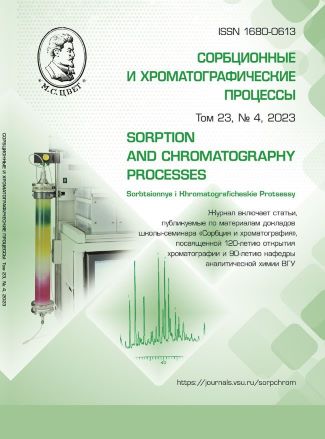Novel highly hydrophilic resins with grafted polymer layers for liquid chromatography
Abstract
The aim of the work was to obtain novel mixed-mode stationary phases with increased hydrophilicity and to apply them in ion and hydrophilic interaction liquid chromatography modes. The resins were prepared by covalent attachment of branched polyethyleneimine and following fixation of polyelectrolytes obtained via reaction of diepoxide and secondary amine on the base of epoxidized polystyrene-divinylbenzene. Polymerization of glycidol in the functional layer of the phases was conducted at an increased pH of the reaction medium for additional shielding of the substrate.
Synthesized resins are highly hydrophilic as compared to the majority of phases based on a copolymer of styrene and divinylbenzene with covalently grafted layers. It is evidenced by a decreased relative retention of polarizable anions, weakly hydrated oxyhalides (up to changing the elution order of bromate), and haloacetic acids in ion chromatography mode. Increased hydrophilicity of the phases in hydrophilic interaction liquid chromatography mode is confirmed by the growth of polar analytes’ retention factors, as well as changing the elution order of ascorbic and nicotinic acids as compared to polystyrene-divinylbenzene-based phases presented in the literature. The low efficiency of the obtained stationary phases in ion chromatography mode was noted, which is associated with slow mass transfer in the bulky polymer functional layer. The negative effect of the polymer layer on efficiency in hydrophilic interaction liquid chromatography is less pronounced due to the presumably smaller thickness of the functional layer’s part involved in this mode.
Proposed synthesis method provided the increase of phase’s efficiency, selectivity, and separation ability in hydrophilic interaction liquid chromatography mode in comparison with phases based on a copolymer of styrene and divinylbenzene described earlier in the literature. Obtained highly hydrophilic resin made it possible to separate mixture of 9 nitrogenous bases and nucleosides in 18 min, 6 vitamins in 24 min, and 8 sugars in 11 min. Thus, the method of hydrophilizing the substrate described in this work is promising for improving the chromatographic characteristics of phases in hydrophilic interaction liquid chromatography and can be used for creation of resins with increased selectivity and efficiency.
Downloads
References
Wan Q.-H. Mixed-Mode Chromatography Principles, Methods, and Applications. 1 ed. Singapore, Springer, 2021: 482 p. https://doi.org/10.1007/978-981-16-5485-5
Weiss J. Handbook of ion chroma-tography. 4 ed. Weinheim, WILEY-VCH Verlag GmbH & Co. KGaA, 2016, 1576 p. https://doi.org/10.1002/9783527651610.
Chambers T.K., Fritz J.S., Effect of polystyrene-divinylbenzene resin sulfona-tion on solute retention in high-performance liquid chromatography, J. Chromatogr. A, 1998; 797: 139-147. https://doi.org/10.1016/S0021-9673(97)01208-9
Kuznetsova O.I., Zatirakha A.V., Smolenkov A.D., Shpigun O.A., Tataurova O.G., Novel anion exchangers based on polystyrene-divinylbenzene with hydro-philic spatially distant functional groups, Sorbtsionnye i khromatograficheskiye protsessy, 2012; 12(6): 940-948. (In Russ.)
Liu J., Wang Y., Cheng H., Wang N., Wu S., Zhang P., Zhu Y., High-capacity anion exchangers based on poly (glycidyl-methacrylate-divinylbenzene) micro-spheres for ion chromatography, Talanta, 2016; 159: 272-279. https://doi.org/10.1016/j.talanta.2016.06.034
Shen Y., Geng H., Zhang F., Li Z., Yang B., A polyethyleneimine-functionalized polymer substrate polar sta-tionary phase, J. Chromatogr. A, 2023; 1689: Article 463711. https://doi.org/10.1016/j.chroma.2022.463711
Shchukina O.I., Zatirakha A.V., Uzhel A.S., Smolenkov A.D., Shpigun O.A., Novel polymer-based anion-exchangers with covalently-bonded func-tional layers of quaternized polyethylene-imine for ion chromatography, Anal. Chim. Acta, 2017; 964: 187-194. https://doi.org/10.1016/j.aca.2017.01.062
Zhang K., Lou C., Zhu Y., Zhi M., Zeng X., Shou D., Covalently grafted anion exchangers with linear epoxy-amine func-tionalities for high-performance ion chro-matography, Talanta., 2019; 194: 485-492. https://doi.org/10.1016/j.talanta.2018.10.062
Chikurova N.Yu., Gorbovskaia A.V., Stavrianidi A.N., Fedorova E.S., Shemyakina A.O., Buryak A.K., Uzhel' A.S., Chernobrovkina A.V., Shpigun O.A., Novel adsorbents for the determination of amino acids in soil extracts by hydrophilic interaction liquid chromatography with mass spectrometric detection, J. Anal. Chem., 2023; 78: 922-932. https://doi.org/10.1134/S1061934823070043
Gorbovskaya A.V., Popkova E.K., Uzhel' A.S., Shpigun O.A., Zatirakha A.V., Resins based on polystyrene–divinylbenzene with attached hydrophi-lized polyethyleneimine for ion and hydro-philic interaction liquid chromatography, J. Anal. Chem., 2023; 78: 748-758. https://doi.org/10.1134/s1061934823060060
Popov A.S., Spiridonov K.A., Uzhel A.S., Smolenkov A.D., Chernobrovkina A.V., Zatirakha, A.V., Prospects of using hyperbranched stationary phase based on poly(styrene-divinylbenzene) in mixed-mode chromatography, J. Chromatogr. A, 2021; 1642: Article 462010. https://doi.org/10.1016/j.chroma.2021.462010
Geng H., Wang Z., Zhang F., Li Z., Yang B., A hyperbranched polyglycerol-functionalized polymer polar stationary phase, J. Chromatogr. A, 2022; 1670: Arti-cle 462946. https://doi.org/10.1016/j.chroma.2022.462946
Geng H., Jing J., Zhang F., Zhang F., Yang B., A polar stationary phase ob-tained by surface-initiated polymerization of hyperbranched polyglycerol onto silica, Talanta, 2020; 209: Article 120525. https://doi.org/10.1016/j.talanta.2019.120525
Pohl C.A., Novel method for ma-nipulation of anion-exchange selectivity by derivatizing hydroxyl groups in the prox-imity of quaternary nitrogen ion-exchange sites with glycidol, Talanta, 2018; 177: 18-25. https://doi.org/10.1016/j.talanta.2017.09.042
Gorbovskaia A.V., Popkova E.K., Uzhel' A.S., Shpigun O.A., Mixed-mode highly hydrophilic polymer-based station-ary phases with grafted polyethylenimine and polyglycidol, J. Anal. Chem., 2024; In press.
Zatirakha A., Pohl C.A., Hybrid grafted and hyperbranched anion exchang-ers for ion chromatography, J. Chromatogr. A, 2023; 1706: Article 464218. https://doi.org/10.1016/j.chroma.2023.464218
Chikurova N.Yu., Prosuntsova D.S., Stavrianidi A.N., Staroverov S.M., Ananieva I.A., Smolenkov A.D., Cher-nobrovkina A.V., Novel mixed-mode ad-sorbents for HPLC based on different sub-strates modified with eremomycin, J. Anal. Chem., 2023; 78: 592-604. https://doi.org/10.31857/S0044450223050031
Schmitt M., Egorycheva M., Fre-richs D., Fiedler S., Graumann P., Seubert A., Factors affecting mixed-mode retention properties of cation-exchange stationary phases, J. Chromatogr. A, 2023; 1695: Ar-ticle 463934. https://doi.org/10.1016/j.chroma.2023.463934







